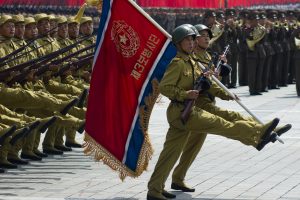North Korea’s recent provocations and saber-rattling highlight the importance of Japan-Republic of Korea (ROK) security cooperation once again. Over the past two months, North Korea detonated a nuclear bomb, tested ballistic missile technology, and threatened South Korea and the United States with a preemptive military strike. These developments, combined with a Japan-ROK political resolution and China’s reluctance to censure North Korea, have created an opening for Japan and South Korea to strengthen their ties and stabilize the Northeast Asian security landscape.
Six months ago, there was speculation that South Korea was gravitating into China’s “orbit” and away from Japan. Many worried when President Park Geun-hye attended a military parade in Beijing as part of her effort to encourage China to exert leverage against North Korea’s nuclear weapons program. Meanwhile, relations between Japan and South Korea continued to suffer as politicized disputes over “comfort women” impeded any significant progress in improving their strained ties.
Today, Seoul interacts with Beijing and Tokyo in a different context. Last December, Japan and South Korea reached a historic agreement to resolve the “comfort women” issue, thus creating space for the two countries to improve security ties. Not long after, Seoul’s relations with Beijing chilled when China chose not to exercise its leverage over North Korea in wake of North Korea’s detonation of a nuclear bomb. As an indicator of China’s reluctance to lend a hand, Xi Jinping apparently refused to take a phone call from Park for a month after the test. Weeks later, North Korea performed a rocket launch in defiance of UN Security Council resolutions, after which China protested South Korea’s decision to enter discussions with the United States to deploy the Terminal High Altitude Air Defense platform to counter North Korean missiles.
South Korea is recalibrating its approach toward North Korea and now knows that China will not help the situation. It is turning to Japan as a reliable partner in this precarious security climate. Solidarity between Japan and South Korea was on display on February 10 when the respective military chiefs from the U.S., Japan, and South Korea agreed to “firmly respond to the [North Korean] acts utilizing trilateral information sharing” and “coordinate further on mutual security issues to enhance peace and stability in the region.” Less than a week later, President Park delivered a stern, nationally televised speech where she warned of North Korean collapse if North Korea continues its nuclear ambitions. As South Korea prepares for an end-game scenario in North Korea, Japan and South Korea are ideal partners for addressing the security and humanitarian challenges in such a contingency.
The maritime sphere is an excellent area for Japan and South Korea to forge these ties. Cooperation among the U.S. Navy (USN), Japanese Maritime Self Defense Force (JMSDF) and the Republic of Korea Navy (ROKN) in areas such as ballistic missile defense, mine-countermeasures, and anti-submarine warfare can help deter, and if necessary, defeat North Korea in wartime. JMSDF-ROKN coordination would also complement U.S. military operations in contingencies related to the Korean peninsula, buttress humanitarian aid and disaster relief (HADR) operations in the event of North Korean collapse, and send a clear message to the region that they remain steadfast in standing up to North Korean aggression.
JMSDF-ROKN cooperation could lend opportunities for Japan and South Korea to coordinate with the U.S. Navy trilaterally in areas such as HADR, anti-piracy, and the freedom of navigation in the South China Sea. The free flow of trade in the South China Sea (SCS) is equally vital to Japan and South Korea, and a coordinated approach with the United States in the SCS would add resistance against China’s destabilizing activity in the region.
Now is an opportune moment to also consider revisiting the possible formulation of a Japan-ROK General Security of Military Information Agreement (GSOMIA). The two countries were on the verge of signing a GSOMIA in 2012, but the hasty rollout of this agreement to the ROK National Assembly and public led to its collapse. The signing of a U.S.-Japan-ROK trilateral information sharing agreement in 2014 was a step in the right direction, but a Japan-ROK GSOMIA would remove the United States as an intermediary and streamline the exchange of North Korea-related intelligence between Japan and South Korea.
As North Korea continues to refine its nuclear technology and missile capabilities, the time for Japan and South Korea to reinvigorate their security ties is overdue. The Japan-ROK relationship is a largely untapped resource that would bolster U.S., Japanese, and South Korean posture towards North Korea and the region at large. There should be no time wasted in harnessing the enormous potential of the Japan-ROK relationship.
Samuel Mun is a Research Assistant at the Project 2049 Institute, a Washington-D.C.based think tank. A version of this article first appeared over at the think tank’s blog here.

































